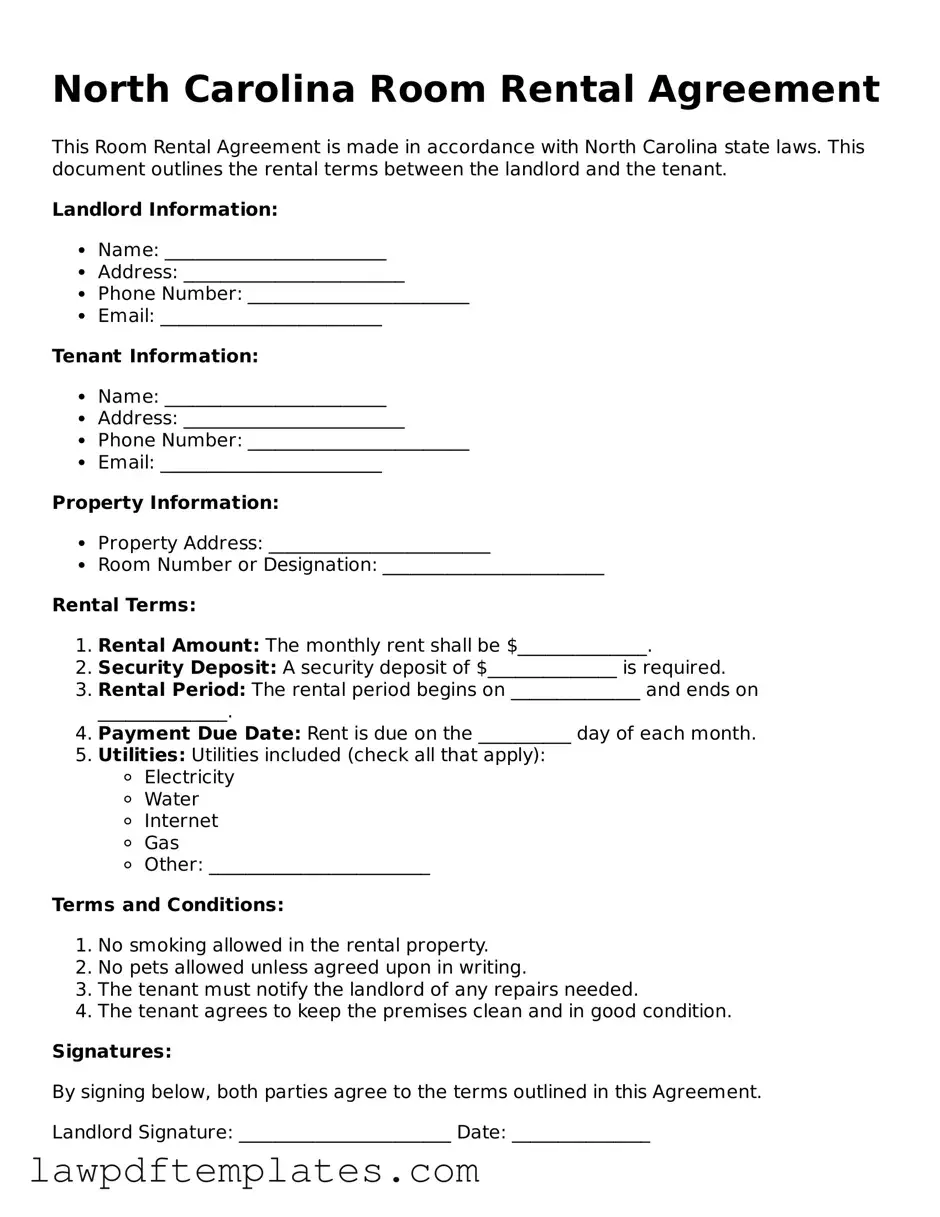Free Room Rental Agreement Template for the State of North Carolina
Form Breakdown
| Fact Name | Description |
|---|---|
| Purpose | The North Carolina Room Rental Agreement form is designed to outline the terms and conditions between landlords and tenants for renting a room within a residential property. |
| Governing Law | This agreement is governed by North Carolina General Statutes, specifically Chapter 42, which covers landlord-tenant relations. |
| Key Components | Essential elements of the agreement typically include rental amount, payment terms, duration of the rental, and responsibilities of both parties. |
| Security Deposit | North Carolina law allows landlords to collect a security deposit, which cannot exceed two months' rent for leases longer than two months. |
| Termination Notice | The agreement must specify the notice period required for termination, which is typically 30 days for month-to-month rentals. |
Sample - North Carolina Room Rental Agreement Form
North Carolina Room Rental Agreement
This Room Rental Agreement is made in accordance with North Carolina state laws. This document outlines the rental terms between the landlord and the tenant.
Landlord Information:
- Name: ________________________
- Address: ________________________
- Phone Number: ________________________
- Email: ________________________
Tenant Information:
- Name: ________________________
- Address: ________________________
- Phone Number: ________________________
- Email: ________________________
Property Information:
- Property Address: ________________________
- Room Number or Designation: ________________________
Rental Terms:
- Rental Amount: The monthly rent shall be $______________.
- Security Deposit: A security deposit of $______________ is required.
- Rental Period: The rental period begins on ______________ and ends on ______________.
- Payment Due Date: Rent is due on the __________ day of each month.
- Utilities: Utilities included (check all that apply):
- Electricity
- Water
- Internet
- Gas
- Other: ________________________
Terms and Conditions:
- No smoking allowed in the rental property.
- No pets allowed unless agreed upon in writing.
- The tenant must notify the landlord of any repairs needed.
- The tenant agrees to keep the premises clean and in good condition.
Signatures:
By signing below, both parties agree to the terms outlined in this Agreement.
Landlord Signature: _______________________ Date: _______________
Tenant Signature: ________________________ Date: _______________
This Room Rental Agreement is governed by the laws of the State of North Carolina.
Common mistakes
Filling out the North Carolina Room Rental Agreement form can seem straightforward, but many people make common mistakes that can lead to misunderstandings or disputes later on. One frequent error is failing to provide accurate personal information. This includes names, addresses, and contact details. Inaccurate information can complicate communication between landlords and tenants, potentially leading to issues when it comes time to address repairs or other concerns.
Another mistake often seen is neglecting to specify the rental term. It’s essential to clearly state the duration of the rental agreement, whether it’s a month-to-month arrangement or a fixed-term lease. Without this information, both parties may have different expectations about how long the rental will last, which can create confusion and conflict.
Some individuals overlook the importance of detailing the rental amount and payment terms. This includes not only the monthly rent but also when it is due and acceptable payment methods. If these details are vague or missing, misunderstandings about payment can arise, leading to potential disputes over late fees or eviction processes.
Additionally, people often forget to include provisions for security deposits. The agreement should clearly outline the amount of the deposit, the conditions under which it may be withheld, and the timeline for its return after the lease ends. Without this information, tenants might find themselves surprised by deductions or delays when they move out.
Another common oversight is not addressing maintenance responsibilities. It’s vital to specify who is responsible for repairs and maintenance during the rental period. If this is left unmentioned, it may lead to disagreements about who should handle issues like plumbing problems or broken appliances.
Lastly, some individuals fail to read the entire agreement before signing. This can result in missing crucial clauses or conditions that could affect their rights and obligations. Taking the time to thoroughly review the document ensures that all parties are on the same page and helps prevent future disputes.
Discover More Room Rental Agreement Templates for Specific States
Lease Agreement for Roommate - Outlines the procedure for handling disputes between landlord and tenant.
Room Rental Lease Agreement - Specifies the length of the rental agreement and renewal options.
The Employment Verification form is a crucial document used to confirm an individual's employment status and history. This form serves a key role in various processes, including loan applications and background checks. For those looking to streamline their verification process, utilizing resources from Fast PDF Templates can greatly enhance accuracy and efficiency.
Roommate Agreement Template Free - The form promotes accountability for both parties throughout the tenancy.
Renting a Room Lease Agreement - Explains the process for renewing or extending the rental agreement.
